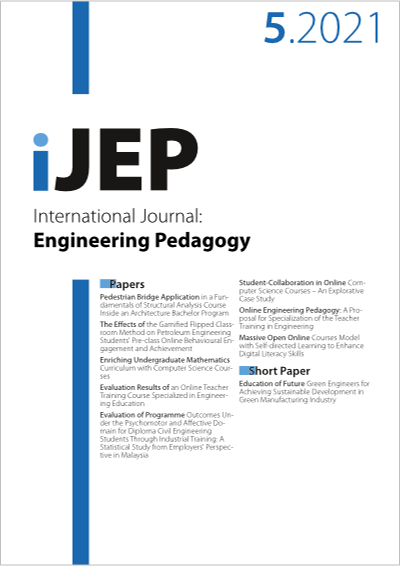Evaluation of Programme Outcomes Under the Psychomotor and Affective Domain for Diploma Civil Engineering Students Through Industrial Training: A Statistical Study from Employers' Perspective in Malaysia
DOI:
https://doi.org/10.3991/ijep.v11i5.22369Keywords:
assessment, psychomotor, affective, students’ performance, employersAbstract
The psychomotor and affective are important domains in Programme Out-comes (PO) and are used to assess the achievement of learning objectives. The psychomotor domain refers to performing motor activities accurately, smoothly, and quickly. The affective components are those personality and behavioural characteristics which focuses on feelings, emotions, and attitudes. Through industrial training, students are exposed to engineering practices, the real civil engineering environments and the ethical and communication skill required. This paper identified the employer's perspective on the students’ attainment for psychomotor and affective domains while undergoing industrial training. There were 272 students are involved in this study that undergoing the Industrial Training in session II 2019/2020. The portion of marks from the industry evaluation for the psychomotor domain is 40% and for the af-fective domain is 10%. The marks were analyzed using descriptive statistical analysis to measure student’s performance. The Pearson correlation (r) was used to identify the relationship between each POs with related domain and the t-test analysis was completed to evaluate any significant difference be-tween the performance evaluation of male and female students. The result shows that most of the students were excellent in the psychomotor and affective domain. The r-value for each POs shows a moderately positive correlation. Therefore, the outcomes of this study can provide input to the faculty to improve the important elements of the psychomotor and affective domain to produce good quality of future civil engineering technical personnel.
Downloads
Published
2021-10-05
How to Cite
Mohd Saim, N., Mohd Noor, N. A., Alias, R., & Rosli, S. H. (2021). Evaluation of Programme Outcomes Under the Psychomotor and Affective Domain for Diploma Civil Engineering Students Through Industrial Training: A Statistical Study from Employers’ Perspective in Malaysia. International Journal of Engineering Pedagogy (iJEP), 11(5), pp. 70–86. https://doi.org/10.3991/ijep.v11i5.22369
Issue
Section
Papers



